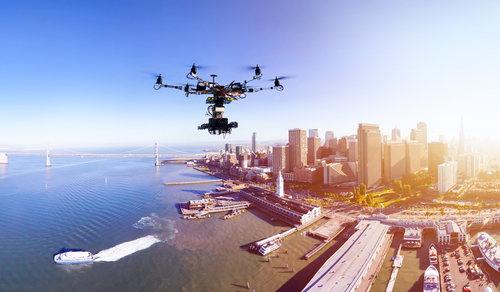
In a new report on commercial drones, the conservative think tank The Heritage Foundation has laid out the expansive penetration of Chinese-manufactured drones into the U.S. market, and has argued for direct government intervention to halt their data collection activities.
Labeling these drones a direct threat, the foundation noted that they boast impressive and rapidly advancing operating systems. Soon, it fears that the capabilities of large drones will wash down to smaller drones, broadening the capability for sensitive data collection by foreign-based corporations, at a time when both state and local agencies lack much means or willingness to confront it. Most drones operate with minimal data protections, openly transfer data and, for Chinese companies, operate under mandatory data-sharing agreements with the Chinese government.
These failures, argued the authors, could eventually see such capabilities turned against the United States, particularly as drone use increases.
For example, the report notes that technology is advancing so rapidly that even facial recognition is now included in many systems, which could soon have the ability to instantly determine the identity of people in crowds using a database of billions of social media images found on sites like Facebook and
YouTube.
“The potential to exploit that data goes well beyond marketing and, in the wrong hands, could harm national security,” the report said. “The United States government needs to address and stop the collection and transfer of data by drones to any foreign-based corporation before this incredible capability is turned against us.”
The report was prepared by John Venable, senior research fellow for defense policy at the Center for National Defense of the Davis Institute for National Security and Foreign Policy, and Lora Ries, senior research fellow in homeland security at
the Center for Technology Policy of the Davis Institute.
Yet the benefits of commercial drones also must be noted. Governments are making greater use of them due to their ability to provide shorter response times, more flexibility and increasingly lower up-front and operation costs than manned helicopters. Even bargain, standard systems have also begun offering features as advanced as facial recognition technology. This leaves the technology open for exploitation without many state and local agencies even realizing it.
In all, the report argued in favor of five recommendations on the matter:
1. Adding global leader in drone manufacturing DJI to the U.S. entity list, which would make it subject to specific licensing requirements for export, re-export or transfer of certain items, particularly due to its role in monitoring for the persecution of Uyghurs inside China.
2. A joint legislative effort to halt unauthorized collection and transfer of data by Chinese drone companies or their subsidiaries.
3. For the U.S. Departments of Justice and Homeland Security to use state and local committees to engage with and educate state, city and county agencies on threats faced from drone technology.
4. For the U.S. Departments of Commerce, Treasury, Defense and Homeland Security to tap the Defense Production Act to encourage domestic technological growth and price reductions for government use.
5. For the Departments of Justice and Defense to utilize grant programs to encourage competition among U.S. drone manufacturers and encourage state and local agencies to use drones not linked in any way to the Chinese Communist Party.
It is time, the report concluded, for state and local agencies to be informed of and reckon with the threats inherent in using Chinese-made drones. The federal government already has, and is.




